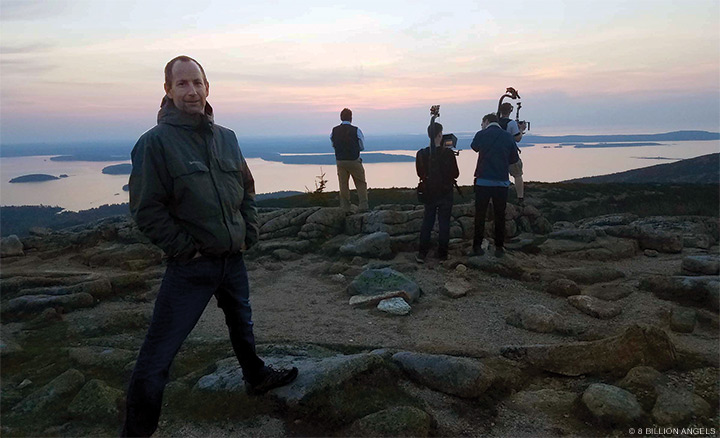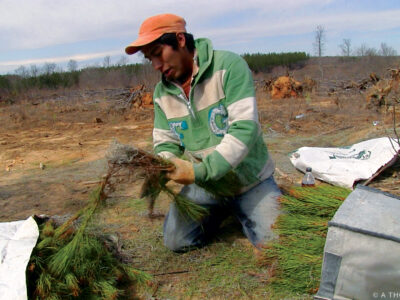
What compelled a real estate executive to produce a film on overpopulation.
Terry Spahr C’88 G’95 never fancied himself a filmmaker, and even now, with his first documentary on its way to film festivals and screenings, he has no plans to continue making movies.
But Spahr says his message was too vast and too vital to take any other form. That’s why, in 2016, he left his 20-year career in real estate and devoted himself to creating 8 Billion Angels.
With Spahr as executive producer, the documentary lays out the problem lurking behind Earth’s greatest environmental woes, from climate change to ocean acidification, deforestation to mass extinctions, rising seas to polluted air. It’s a problem people don’t like to talk about: the sheer number of us.
It took thousands of years for Earth’s population to hit 5 billion, which it did in 1987. Now we’re already well past 7 billion and quickly closing in on 8. “We have a human-impact crisis,” Spahr says, “and we need to really talk about our population and the unsustainable growth of it. … [It] needs to be discussed if we truly care about getting on an authentic path towards sustainability.”
Spahr decided that a film was his best chance to get people talking about overpopulation—even if his resume notably lacked any filmmaking experience. After majoring in history at Penn while playing four years of squash, he worked in insurance and financial services, then returned to Penn in 1995 for a master’s in government administration.
At 29, Spahr ran for a seat in the Pennsylvania House of Representatives to make “a substantive change in the world,” he says. He lost and hasn’t tried for office since. “It was a longshot,” he adds, “but something I relished doing.”
He worked for Long & Foster Real Estate, climbing his way up from realtor to regional executive vice president. Environmental activist wasn’t part of his job description, but in his off hours, Spahr often found himself thinking about humanity’s health and sustainability.
Inside a Maine gift shop in the early 2000s, he spotted a sticker that would later inspire the title of his film. “I’m paraphrasing, but it said something to the effect of, We have 6 billion angels in the world, do we need more angels?” he remembers. “That’s when it dawned on me: Are we populating the world so much that we’re really impacting it dramatically?
“I found that when I kept asking why—why climate change, why the rising tides, why the pollution—there was a common thread: there are just too many people consuming too many resources and emitting too much waste.”
He began reading everything he could find on the subject, from Elizabeth Kolbert’s book The Sixth Extinction, to Alan Weisman’s Countdown, to “hundreds and hundreds of papers by scientists.” But in all of his research on overpopulation, Spahr noticed there was a hole. “There really hadn’t been a good film or documentary on the impacts of unsustainable population growth,” he says, “and I felt that there was a need for that.”
So he left his job and launched the three-year passion project that has become 8 Billion Angels.
From the outset, he turned to film-savvy Penn alums for help. He brought an early outline to his friend Kathy Demarco Van Cleve C’88 W’88 and her husband Emory, both lecturers in Penn’s cinema studies program, for feedback on shaping the dramatic structure. He also consulted his former Penn squash teammate, Alec Sokolow C’85, a screenwriter who offered further insights on storytelling—and encouraged him to take creative risks.
Meanwhile, Doug Alexander EE’83 W’83 connected Spahr with his daughter, Katya, who became the film’s lead producer. With Katya and the rest of his crew, Spahr traveled the world, interviewing activists and experts (including Zoe Weil C’83 G’83, cofounder and president of the Institute for Humane Education) and shooting footage in Japan, India, and across the US.
Beyond laying out the problem, Spahr says he also wanted to offer solutions. The film finds them in increasing girls’ access to education and expanded funding for family planning. Spahr himself is offering an additional solution with Earth Overshoot, a nonprofit he founded that’s focused on making people aware of unsustainable population growth and finding ways to address it. “I’m not by training a filmmaker, nor do I intend to stay in the film world,” he says. “It was the medium for the message and the mission.”
During a screening of his documentary at Penn Homecoming this year, Spahr introduced the film, fielded audience questions, and participated in a public interview with Penn cinema studies professor Peter Decherney.
That same week, the film played at the American Public Health Association Film Festival’s kickoff event. It will reach audiences at the Jaipur International Film Festival in January and the National Science Teaching Association in April. Spahr hopes more film festivals will soon join that list, and he’s planning for a public release in New York this spring.
“It’s exciting to learn something new and different every day,” he says of his second act as an environmental activist. “But it’s certainly fraught with the frustrations that come along with trying to take an enormous problem and shift it in the right direction.”
Still, he says, “when you see signs that it is changing and people are talking more about unsustainable population growth, it makes you feel that your efforts are worth it.”
—Molly Petrilla C’06




